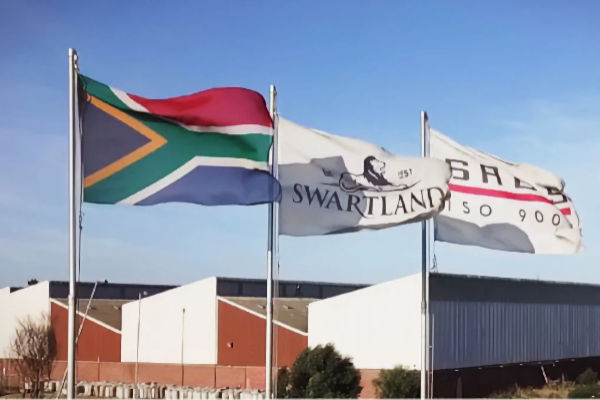Major South African company could shut down exports after operating for 35 years
Major South African company could shut down exports after operating for 35 years

Swartland, a South African manufacturer of windows, doors, and timber products, could be forced to close its export business after 35 years of operation due to incoming US tariffs.
Founded in 1951 in the small wheat-farming town of Moorreesburg, north of Cape Town, Swartland began as a hardware store run by Oupa Hanekom.
Over the decades, it became a national business specialising in joinery and building supplies. The second generation, led by Hanekom’s son Jurgens, expanded the business’s product line and ventured into the export market.
Today, the third generation, Jurie, James, and Hans Hanekom, are at the helm and continue the family legacy.
Swartland has expanded across four provinces and Namibia, with a distribution fleet of 50 trucks servicing hardware stores across sub-Saharan Africa.
The company also owns the Boskor Sawmill in the Southern Cape, which supplies FSC-certified pine timber.
With a workforce of over 1,400 employees and exports to the UK and the US, Swartland has grown into one of South Africa’s largest suppliers of building products.
However, its long-standing relationship with the US market is under threat.
“The 30% tariff would be devastating to our export operations, and makes exporting to the US no longer commercially viable,” said John Lamb, Swartland’s chief business development officer, told News24.
“It really is that ‘short and sweet’. With a 30% premium, we are no longer competitive with local US manufacturers and other international competitors.”
Lamb explained that about 25% of Swartland’s total production is exported, and 70% of that goes to the United States.
The impact of the new tariffs, which come into effect seven days after the signing of former US President Donald Trump’s executive order, could be the end for the company’s export business.
Swartland has been exporting to the US since 1990. This means this side of the business could be forced to close after 35 years in operation, and risk the jobs of the 350 people who work on the exports side.
“To mitigate 30% is virtually impossible. Most raw materials have world market price parity attached to them,” Lamb said.
“This only leaves us the labour component that we can reduce in order to reduce costs, and that is contrary to our overall strategy of expanding our workforce.”
The governemnt needs to do more, and faster
Swartland is one of many South African companies that have been or will be affected by the US’s new trade stance.
Jendamark Automation, an automotive technology manufacturer based in Gqeberha, has already lost R750 million in contracts due to the tariffs.
South African Reserve Bank governor Lesetja Kganyago warned that the broader effects of the tariffs could be significant, with over 100,000 jobs in the agricultural and automotive sectors at risk.
“The impact on employment and economic growth cannot be underestimated,” Kganyago cautioned.
South Africa’s agricultural sector is also bracing for a hit. The country’s largest farm lobby said the tariffs would immediately affect the R35 billion citrus industry, which is currently in its peak picking season.
Wandile Sihlobo, chief economist at the Agricultural Business Chamber of South Africa, said that while diversification of export markets is important, it is no substitute for trade with the US.
“Diversification should not be viewed as a replacement for the US, but as part of the long-standing focus on export expansion and growth strategy for the South African agricultural sector,” he said.
President Cyril Ramaphosa confirmed that Pretoria is actively engaging with Washington. “All channels of communication remain open to engage with the US,” he said.
He added that the government is preparing a support package for affected businesses. However, details remain vague.
However, experts such as Business Leadership South Africa CEO Busi Mavuso said the government’s response needs to be urgent and concrete.
“These interventions need to be put in place quickly or we risk catastrophic collapse of manufacturing and farming businesses,” she warned.
Mavuso added that the Eastern Cape, with its dense automotive industry supply chains, is especially vulnerable.
“South Africa is in a crisis, and the government’s response needs to match this reality,” she said.
Source: Business Tech
























